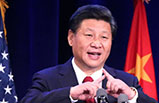India most attractive investment destination by global investors
(China Daily USA) Updated: 2015-10-20 11:03India has been ranked as the most attractive investment destination in the world for the next three years, according to 'Ready, set, grow: EY's 2015 India attractiveness survey,' published on Oct 14 by EY. Thirty-two percent of the business leaders from global corporations who were polled for the survey said India is the most attractive investment destination in the world, followed by China, Southeast Asia and Brazil.
EY is a global leader in assurance, tax, transaction and advisory services.
The survey, conducted during March and April 2015, includes the views of more than 500 decision-makers from multinational organizations across sectors including industrials, automotive, consumer products, life sciences, infrastructure, technology, financial services and others. The report also presents a detailed overview of foreign direct investment (FDI) inflows and projects, covering sectors, emerging FDI destinations and countries of origin.
It finds major gains in perception in comparison to the findings of the 2014 survey in key areas such as macroeconomic stability (up from 70% in 2014 to 76% in 2015), political and social stability (up from 59% in 2014 to 74% in 2015); relaxation in FDI policy (up from 60% in 2014 to 68% in 2015); and the government's efforts to ease doing business (up from 57% in 2014 to 67% in 2015). Among India's most attractive features for doing business, investors rated its vast domestic market and availability of labor as most appealing.
Rajiv Memani, EY Chairman of the Global Emerging Markets Committee and India Regional Managing Partner, said: "The survey findings are a testament to India's growing appeal with the global investment community. Over the last year, the improvement in India's macroeconomic indicators, accompanied with the ongoing efforts to revitalize growth have offered new hope to investors. It is an encouraging start and we need to build upon it further."
Speaking at the launch of the report, Amitabh Kant, Secretary, Department of Industrial Policy and Promotion, India's Ministry of Commerce and Industry,said: "We are determined to make India an extremely easy and simple place to do business. Our first priority is to do away with the many procedures and rules, followed by bringing in consistency and clarity in all our policies and tax regime and developing a world-class infrastructure."
Among specific reforms expected to drive growth, 89% of the investors said that investment in infrastructure projects and the 100 Smart Cities project would be significant, while both financial inclusion, including Digital India and proposed corporate tax reduction from 30% to 25%, were considered significant by 83% of the respondents. Implementation of Goods and Services Tax (GST) and legislation on land acquisition were also mentioned by investors as important for attracting FDI.
Gaurav Taneja, Partner and National Leader – Government & Public Sector - EY India, said: "With the pro-reform government at the center, the state governments in India have also embarked on adopting policies and processes to attract investments. These include reforms in labor laws, single window clearances, online compliance and land availability, which play a very significant role in investors' choice of locations. Importantly, there is also a perceptible shift in attitude to one of welcoming investments."
More than three out of five respondents said they had plans to invest in India over the next year and 62% are looking at manufacturing, both to serve the Indian and global markets from India. Most of these respondents prefer to expand existing operations, followed by expansion through acquisitions and, if necessary, by joint ventures and alliances. Compared to the 2014 survey, the number of respondents who believe that India will be among the world's leading top three destinations for manufacturing by 2020 has increased from 24% to 35%, while those who believe India will evolve as a regional and global hub for operations is up from 9% to 21%.
The increased interest in investing in manufacturing is also reflected in FDI inflows, which showed a 62% increase in calendar year 2014 compared to the previous year, ahead of the 31% growth in the services sector FDI.
In the same period, the share of manufacturing in total FDI increased from 37% to 45%. The trend continues in the first six months of 2015 with manufacturing registering a 221% increase in FDI inflows. Among sectors, defense and aerospace, cleantech, automotive, metals and mining, consumer products and energy have shown a sharp increase in FDI, while infrastructure, life sciences and chemicals declined during the year. Financial services FDI inflows grew at 128% year-on-year, outperforming the overall 31% services sector growth.






